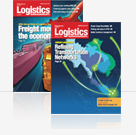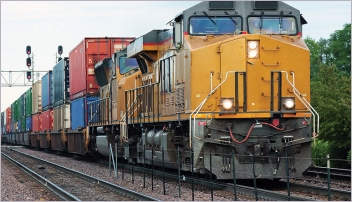Moore on Pricing: Digital settlement is coming
What will we gain from digital freight settlement? Think about no more EDI messaging costs or pre-audit and post audit fees.

Technology in the News
Scaling mobile robotic fleets for success 5 Innovative Ways Manufacturers Can Optimize Their Logistics Operations How companies need to evolve to achieve Supply Chain Resiliency Compliance Risk: A Significant Impediment to the Modern Supply Chain Read the Latest Gartner® Market Guide for Supply Chain Strategy, Planning and Operations Consulting 更多的技术NewsTechnology Resource
5 Innovative Ways Manufacturers Can Optimize Their Logistics Operations Download this new white paper to discover the five steps that manufacturers can take and partners they can work with to drive innovation and make their logistics operations more effective and efficient.
Download this new white paper to discover the five steps that manufacturers can take and partners they can work with to drive innovation and make their logistics operations more effective and efficient.All Resources
The list of key documents that must be verified and executed in an international shipment includes a commercial invoice, the bill of lading, Customs documents, drayage and the domestic bill of lading. On top of that, there’s a need for tracking information and accurate freight billing.
Today, these are all separate transactions with records are presented and stored in various places in the offices of the shipper, the carrier and the third parties involved. Freight bill payment is a separate and distinct transaction usually still done by matching of documents.
The expectation of “digital logistics” is that all of this will be collected, indexed and securely transferred to all the parties in the supply chain automatically. The payment of freight bills would be and should be dependent on the payor receiving all their transactional data as well as a delivery notice. In this way, freight payment becomes “freight settlement.” The data will be used to close sales, dispense funds, relieve inventory and feed production planning systems.
Think about the financial records and critical performance records inherent in a transportation contract. If this were a real estate sale, all the documents, title assurances, inspection records and disclosures would be accepted and signed off before a check is handed to the seller. This has been a just a pipe dream for supply chain professionals—until blockchain.
Blockchainis an incorruptible digital ledger of economic transactions that can be programmed to record not just financial transactions, but virtually everything of value. The distributed network of information means no one individual or company can manipulate the information, and all participants can see the same history.
The promise of blockchain is that all relevant data elements having to do with everything from product integrity to cost and service performance are securely collected at each step in the supply chain. With this in mind, I suggest that a validated blockchain record should be the basis of payment for a logistics service.
In the past two years things have started to happen on this front. In the ocean market, major players have teamed up to create a blockchain-based platform for tracking and transaction support called TradeLens.
Service providers, ports and the government have started to find common ground for standards. In December, the U.S. Federal Maritime Commission authorized the parties to cooperate with respect to the provision of data, principally bill of lading information, using the TradeLens solution.
Today,TradeLensmembers generate shipping transaction data of over half the number of container lines that sail across international waters—a remarkable stimulus for the possibilities of blockchain. These organizations see the value in standardizing a secure digital ledger. But there’s more.
Founded in August 2017, theBlockchain In Transport Alliance (BiTA)has quickly grown into the largest commercial blockchain alliance in the world, with nearly 500 members in over 25 countries that collectively generate over $1 trillion in revenue annually. The BiTA Standards Council is focused on creating open source and royalty-free standards with a focus and emphasis on data formats and interoperability.
The first logistics blockchain standards are BiTA’s Standard 120-2019: Location Component. The standard provides the initial framework for interoperability across a currently fragmented and siloed ecosystem that reaches across many different enterprises, systems and various protocols.
These are encouraging moves coming much faster than past industry standard initiatives, but they are just a first step in connecting all parties with standards for physically and financially secure transactions. The real power will come from using transactional data to confirm actions and trigger payments. Think about what standardized digitization has done to the airline ticketing process.
What will we gain from digital freight settlement? Think about no more EDI messaging costs or pre-audit and post audit fees. There will be faster claim payments, clean data for network modeling and the near elimination of fake pharmaceuticals and other valuable products. Once we see blockchain-based freight settlement and realize the benefits we’ll never look back.

About the Author
 Peter MoorePeter Moore is Adjunct Professor of Supply Chain at Georgia College EMBA Program, Program Faculty at the Center for Executive Education at the University of Tennessee, and Adjunct Professor at the University of South Carolina Beaufort. Peter writes from his home in Hilton Head Island, S.C., and can be reached at[email protected]
Peter MoorePeter Moore is Adjunct Professor of Supply Chain at Georgia College EMBA Program, Program Faculty at the Center for Executive Education at the University of Tennessee, and Adjunct Professor at the University of South Carolina Beaufort. Peter writes from his home in Hilton Head Island, S.C., and can be reached at[email protected]

Subscribe to Logistics Management Magazine!
Subscribe today. It's FREE!Get timely insider information that you can use to better manage your entire logistics operation.
Start your FREE subscription today!
 5 Innovative Ways Manufacturers Can Optimize Their Logistics Operations
Download this new white paper to discover the five steps that manufacturers can take and partners they can work with to drive innovation and make their logistics operations more effective and efficient.
Download Today!
5 Innovative Ways Manufacturers Can Optimize Their Logistics Operations
Download this new white paper to discover the five steps that manufacturers can take and partners they can work with to drive innovation and make their logistics operations more effective and efficient.
Download Today!
 It has been a very volatile year, complicated by general political and economic instability around the globe. For logistics and supply chain professionals and carrier executives, it’s time to respond and build a coherent, cohesive, flexible and resilient strategy in the face of rapid and continuous change.
It has been a very volatile year, complicated by general political and economic instability around the globe. For logistics and supply chain professionals and carrier executives, it’s time to respond and build a coherent, cohesive, flexible and resilient strategy in the face of rapid and continuous change.Merger and Acquisition Momentum: 2022 Top 20 Warehouses Truckload: Easing back to normal? View More From this Issue
 How companies need to evolve to achieve Supply Chain Resiliency
Join our webinar, hosted by Adrian Wood from Dassault Systèmes, to learn about the key requirements and considerations in the supply chain resiliency evolution.
Register Today!
How companies need to evolve to achieve Supply Chain Resiliency
Join our webinar, hosted by Adrian Wood from Dassault Systèmes, to learn about the key requirements and considerations in the supply chain resiliency evolution.
Register Today!








